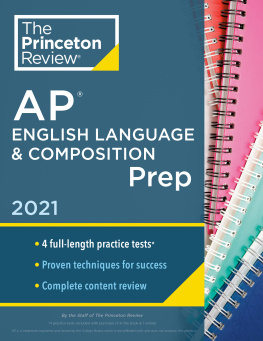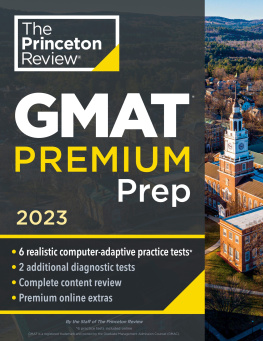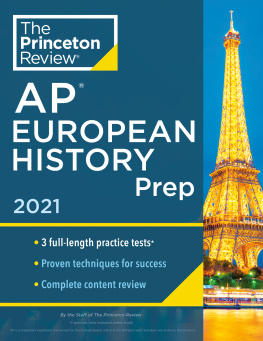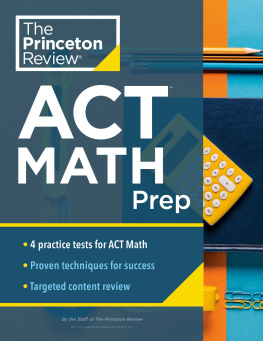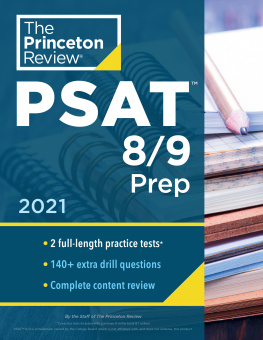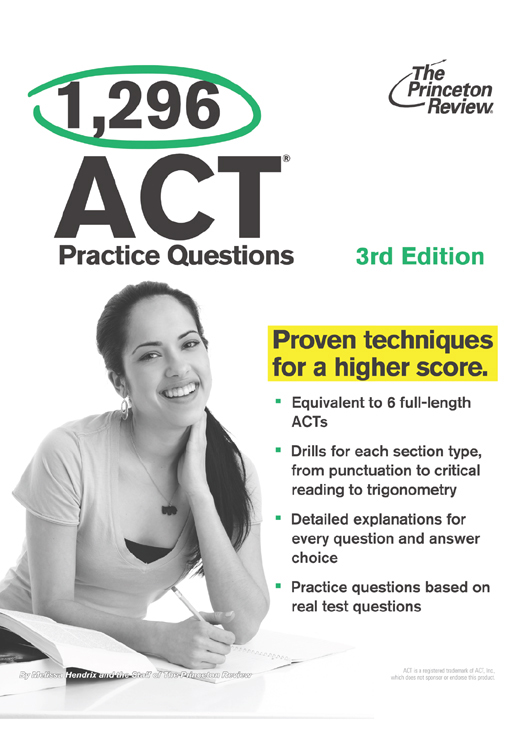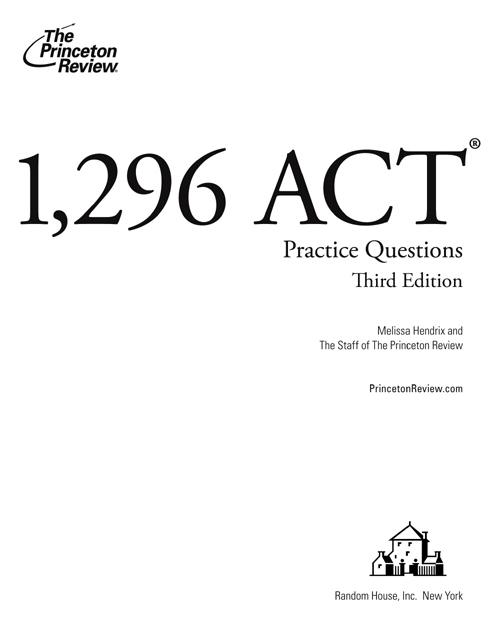
Editorial
Rob Franek, Senior VP, Publisher
Selena Coppock, Senior Editor
Calvin Cato, Editor
Kristen OToole, Editor
Meave Shelton, Editor
Random House Publishing Team
Tom Russell, Publisher
Nicole Benhabib, Publishing Director
Ellen L. Reed, Production Manager
Alison Stoltzfus, Managing Editor
The Princeton Review, Inc.
111 Speen Street, Suite 550
Framingham, MA 01701
E-mail:
Copyright 2013 by TPR Education IP Holdings, LLC
Cover art Jonathan Pozniak
All rights reserved under International and Pan-American Copyright Conventions. Published in the United States by Random House, Inc., New York, and simultaneously in Canada by Random House of Canada Limited, Toronto.
The Princeton Review is not affiliated with Princeton University.
eBook ISBN: 978-0-307-94593-8
Trade Paperback ISBN: 978-0-307-94570-9
Editor: Liz Rutzel
Production Editor: Berryville Graphics, Inc.
v3.1
a
r2
Acknowledgments
The following people deserve thanks for their contributions to this edition: Melissa Hendrix, Brian Becker, Rob Hennen, Mindy Myers, David Stoll, Danny Chun, Steve Voight, Calvin Cato, Kathy Carter, and Deborah Silvestrini.
Contents
So you think you need more practice? Well, we have tons of practice right here for you. We have accumulated the equivalent of six full ACTs to help you get your best possible score on this beastly test! After all, the harder you practice, the better youll be on test day.
Since you probably know the basics of how the test is conducted, well spare you that information. What we will give you here is a breakdown of the tests on theACT.
1. English Test (45 minutes75 questions)
In this section, you will see five essays on the left side of the page. Some words or phrases will be underlined. On the right side of the page, you will be asked whether the underlined portion is correct as written or if one of the three alternatives listed would be better. The English test covers topics in grammar, punctuation, sentence structure, and rhetorical skills.
2. Math Test (60 minutes60 questions)
These are the regular, multiple-choice math questions youve been doing all your life. The easier questions tend to come in the beginning and the difficult ones in the end, but the folks at the ACT try to mix in easy, medium, and difficult problems throughout the Math test. A good third of the test covers pre-algebra and elementary algebra. Slightly less than a third covers intermediate algebra and coordinate geometry (graphing). Regular geometry accounts for less than a quarter of the questions, and there are four questions that cover trigonometry.
3. Reading Test (35 minutes40 questions)
In this section, there will be four reading passages of about 800 words eachthe average length of a People magazine article but maybe not as interesting. There is always one prose fiction passage, one social science passage, one humanities passage, and one natural science passage, and they are always in that order. After reading each passage, you have to answer 10 questions.
4. Science Reasoning Test (35 minutes40 questions)
No specific scientific knowledge is necessary for the Science Reasoning test. You wont need to know the chemical makeup of hydrochloric acid or any formulas. Instead, you will be asked to understand six sets of scientific information presented in graphs, charts, tables, and research summaries. In addition, you will have to make sense of one disagreement between two or three scientists. (Occasionally, there are more than three scientists).
5. Optional Writing Test (30 minutes)
The ACT contains an optional Writing test featuring a single essay. We recommend you take the ACT Plus Writing version of the test because most schools require it. The essay consists of a prompt relevant to high school students on which you will be asked to write an essay stating your position on the prompt. Two people will then grade your essay on a scale of 1 to 6 for a total score of 2 to12.
If you are unsure about any of the sections or if you want more strategies for conquering these kinds of questions, you can find more information at PrincetonReview.com or you can review our Cracking the ACT book.
What you should also know is that the key to raising your ACT score does not lie in memorizing dozens of math theorems, the periodic table of elements, or obscure rules of English grammar. Theres more to mastering this test than just improving math, verbal, and science skills. At its root, the ACT measures academic achievement. It doesnt pretend to measure your analytic ability or your intelligence. The people at ACT admit that you can increase your score by preparing for the test, and by spending just a little extra time preparing for the ACT, you can substantially change your score on the ACT (and the way colleges look at your applications). After all, out of all the elements in your application package, your ACT score is the easiest to change.
That being said, we have included in this book three complete practice ACT exams and the equivalent of three exams worth of drill questions. Rest assured that these tests and questions are modeled closely on actual ACT exams and questions, with the proper balance of questions reflective of what the ACT actually tests.
At the beginning of this book, youll find one complete ACT practice test. After youve taken that test, score it to learn your strengths and weaknesses. Next in the book, you will see three full-length drills for each subject type. The questions are compiled in the same arrangement as you would see on a real test, so you can keep track of your timing and your progress. These drills can help you get outstanding scores on the subjects you already do well in and better scores on the subjects you might be struggling with. After the drills, youll find two more complete ACT practice tests. We suggest you use these to gauge your full testing capacity by taking them in an environment as close to the real conditions as possible. After the drills, you shouldnt be worried about your scores, and these two final practice exams will not only give you more practice, but they will also give you some assurance that all that practice will pay off in the end.
A final thought before you begin: The ACT does not predict your ultimate success or failure as a human being. No matter how high or how low you score on this test initially, and no matter how much you may increase your score through preparation, you should never consider the score you receive on this or any other test a final judgment of your abilities. When its all said and done, we know youll get into a great school and that youll have an incredible experience there.
We wish you the best of luck, even though you wont need it after all this practicing!
The Princeton Review



